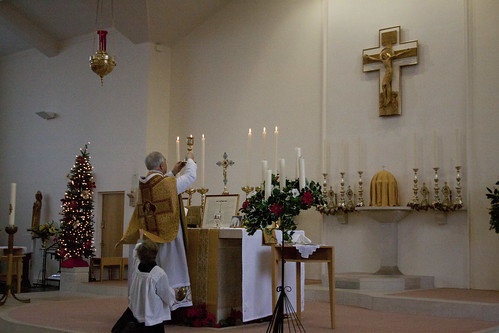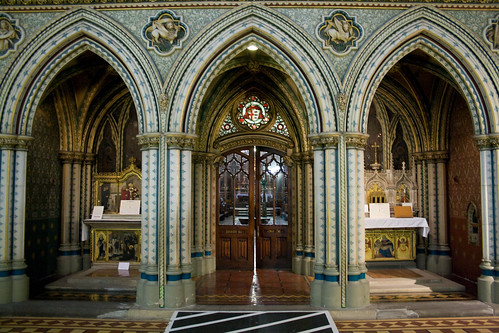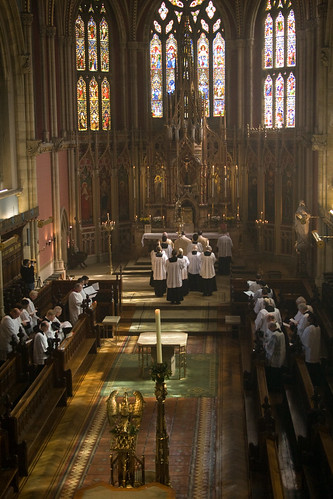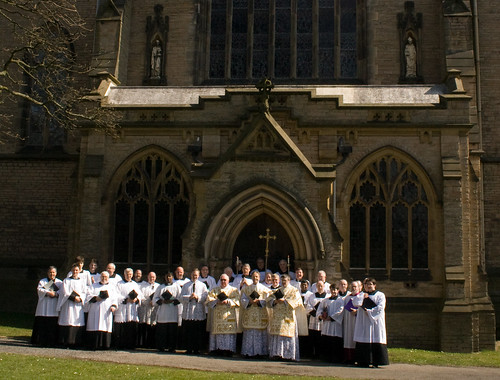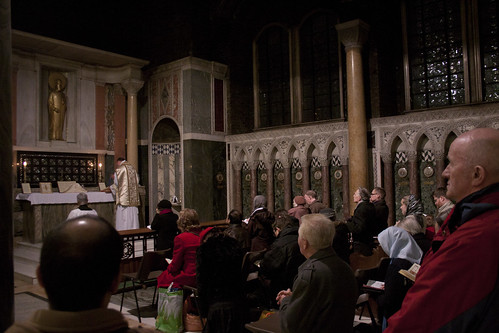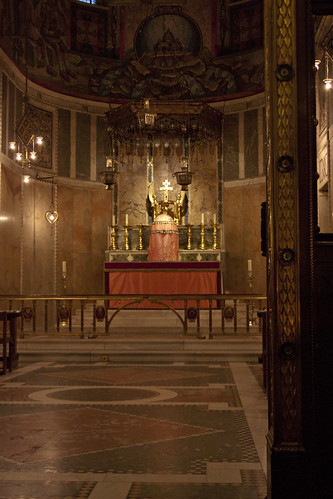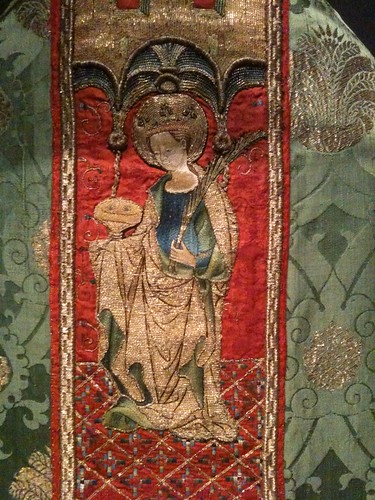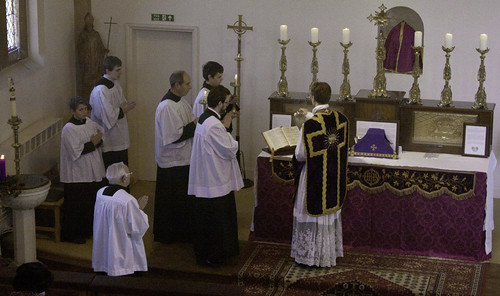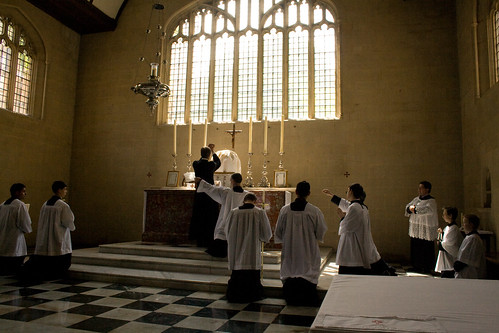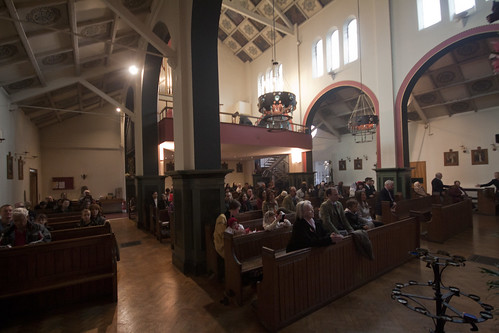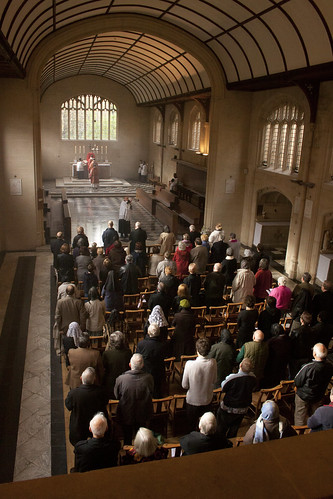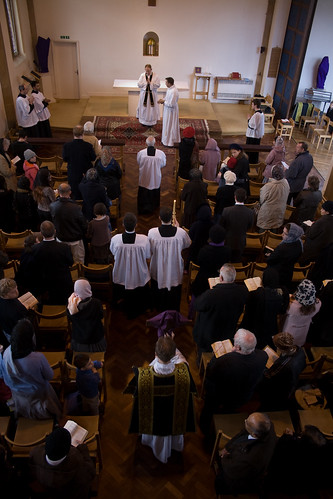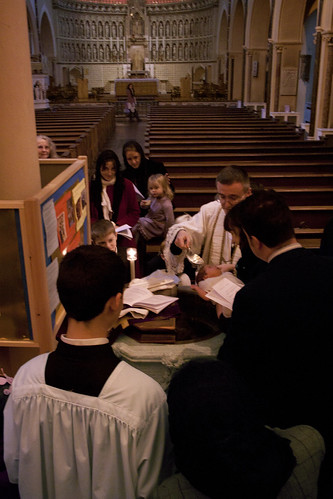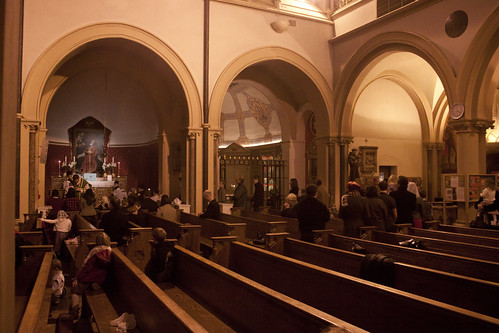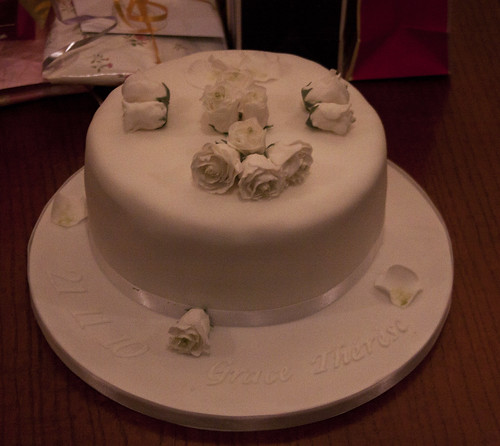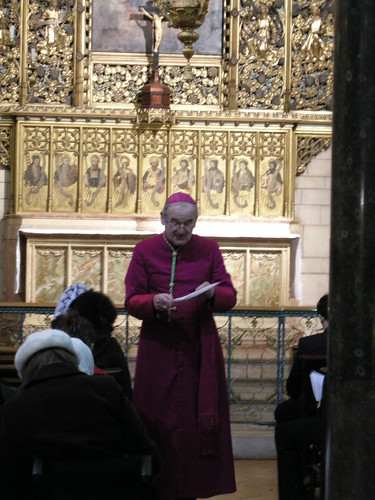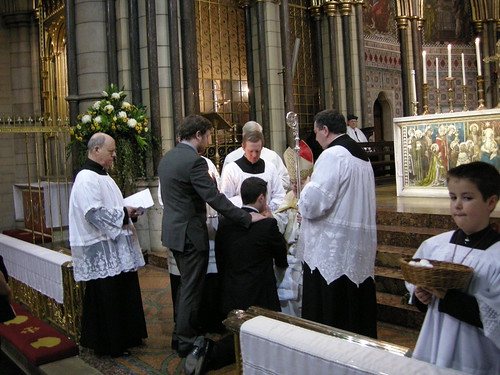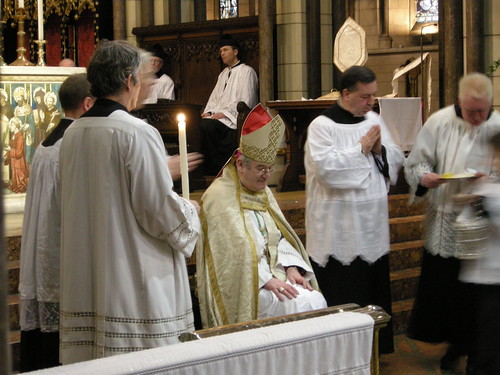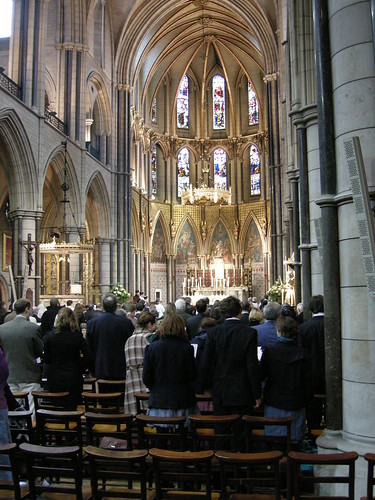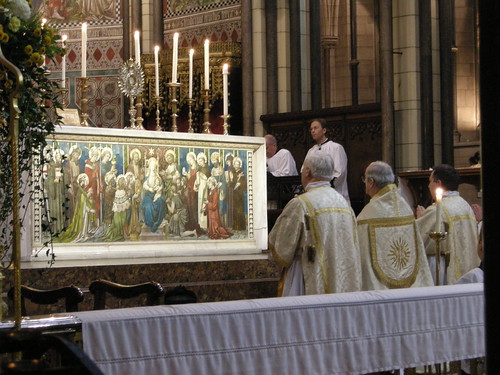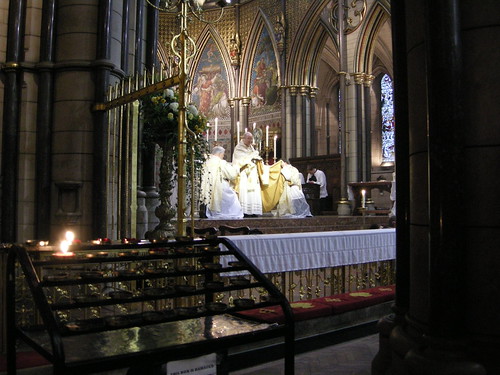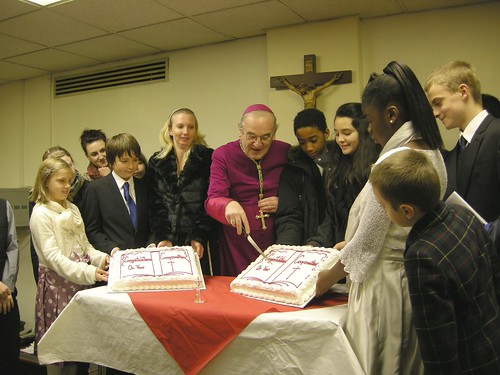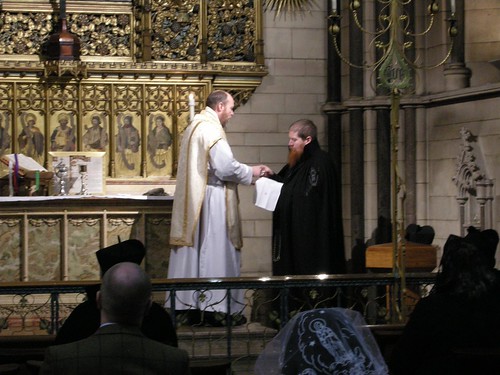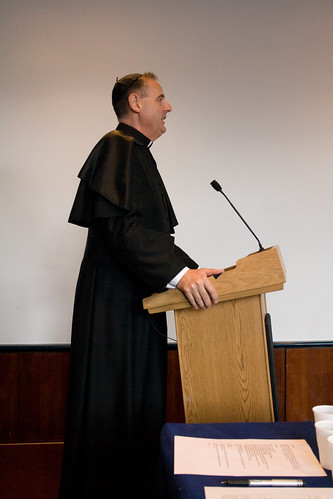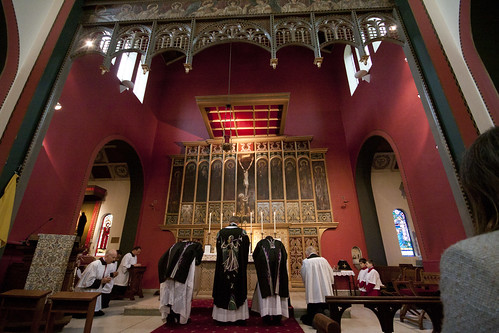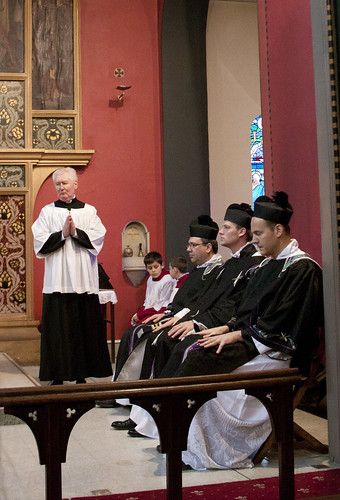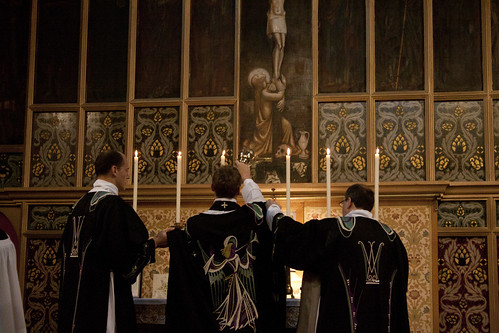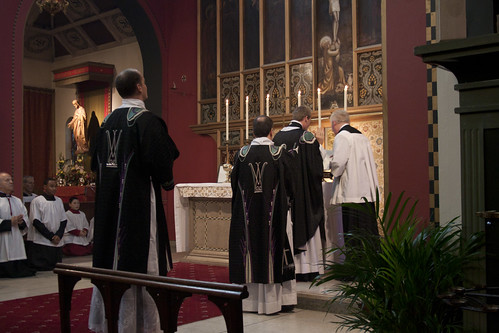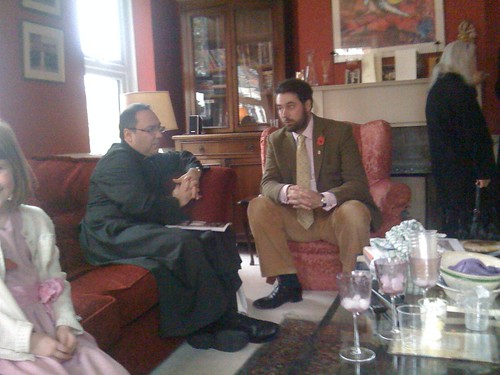 Before Christmas I was able to read the whole, full and complete version of the report made to Rome by the Una Voce Federation, on the application of the Motu Proprio Summorum Pontificum. An edited version (which includes a summary of the national reports, but not the national reports themselves) can be seen on the FIUV website, as can a gracious note of thanks from Mgr Pozzo, Secretary of the Pontifical Commission Ecclesia Dei, which is now part of the Congregation for the Doctrine of the Faith.
Before Christmas I was able to read the whole, full and complete version of the report made to Rome by the Una Voce Federation, on the application of the Motu Proprio Summorum Pontificum. An edited version (which includes a summary of the national reports, but not the national reports themselves) can be seen on the FIUV website, as can a gracious note of thanks from Mgr Pozzo, Secretary of the Pontifical Commission Ecclesia Dei, which is now part of the Congregation for the Doctrine of the Faith.It is obviously necessary that the detailed reports for each country, prepared by the member associations of the Una Voce Federation, be kept confidential, but Leo Darroch, the President, is able to make some aspects public in his introduction to the report available on the website, and I thought I'd make some general observations of my own.
The overarching conclusion of the report is that progress has been very slow since the Motu Proprio came into force, in most (in fact nearly all) places. This is not because of the terms of Motu Proprio itself, which are extremely liberal - any priest can say the Mass privately, any Parish Priest can introduce one into his parish schedule, the laity can ask for it and must be given it. Rather, it is because of a continuing negative attitude towards the Church's liturgical traditions. I wouldn't single out bishops in this repect: hostility from the laity, from ordinary priests, from priests in roles of authority (area deans, seminary rectors, vicars general or whatever), bishops, cardinals, and even in a few cases officials of the Roman curia, all have their part to play. At every level in the Church one will find people enthusiastic about the Traditional Mass, people ferociously opposed to it, and people who are indifferent. The problem is that the opponents of the Traditional Mass, who are now in effect opponents of the Motu Proprio and of the Holy Father's promulgated will and policy, are too often in a position to make things unpleasant, or impossible, for those wishing to make use of their freedom to attend or celebrate the extraordinary form of the Roman Rite.
The Traditioinal Mass is reletively easy to impede because in order to start saying it most priests need special training, which takes time, and in order to introduce it into a parish a priest needs a good deal of time, effort, and resources, in preparing the faithful, training servers, finding ways to celebrate 'ad orientem' and so on. This patient work can be undone in a moment if a priest is moved to another parish, or if there is a sufficient fuss orchestrated in his parish. It is always easier to destroy than to build up, so the effort of liturgical restoration will always be an up-hill task.
This was true before the Motu Proprio came out, and the MP has made a positive difference, at least in many places. Some, obviously not all, of those indifferent to the Traditional Mass have begun to engage with it at some level, and in some cases have become enthusiasts for it. Some, but not all, of the people in authority who were previously holding things back have adopted a laissez-fair policy.
Others have at least modified their opposion - as one priest remarked to me, the Motu Proprio seems to have got many people in authority in the church to apply the terms of the 1988 document, Ecclesia Dei Adflicta (EDA). EDA said that where there was demand, some provision should be made, and Summorum Pontificum says that any priest can say the Mass, and any lay group demand it. What we found after EDA too often was that no provision was made, and what we find after Summorum Pontificum is that the free for all it legislates is resisted, but an EDA-type 'provision' is finally made. Thus one frequently hears that a priest should not start saying the Traditional Mass because it is already being said in a particular church in the diocese - not necessarily nearby. This kind of argument simply has no basis in the provisions of Summorum Pontificum.
There are wide areas of the Catholic world, however, where in the face of determined opposition and an only incipient lay organisation to support priests wishing to say the Traditional Mass, very little has been acheived in the last three years.
The countries where most progress has been made are France, the United States of America, and England and Wales. The Latin Mass Society is the oldest association in the Federation, and is also the best funded, and it has the most complete organisation, in terms of having a national network of representatives and a staffed headquarters. Looking around the world it is evident how important a lay organisation supporting the Traditional Mass is, but also how difficult it is to establish and maintain such an organisation if there is very little going on: if there are no Traditional Masses to go to, it is hard to maintain or develop enthusiasm for it. In England most Catholics don't know what the Traditional Mass is, and we are better off than almost anywhere else in the world.
One question which I asked as I read the reports was about the Motu Proprio's mechanism for taking appeals for the Traditional Mass from groups of laity, first to a parish priest, then the bishop, then to Rome: my question is whether this mechanism is actually functioning as it should be, and whether it is able to produce results.
At first glance the answer seems to be 'no'. A number of strategies are used to circumvent it: it is claimed that all the members of the group requesting the Mass must demonstrate their committment to the Mass in some arbitrary way, or must all come from a single parish, or must be of some arbitrarily large size. These sorts of claims are contrary to the spirit and letter of the Motu Proprio. But the most common, and perhaps most successful, ploy in many places appears to be simply ignoring the appeals. A group of faithful compose a letter to a parish priest, with a peitition with a good number of signatures; it is duly delivered to a parish priest, and there is no response. Or perhaps the priest says he can't satisfy the request, and passes the matter on to the bishop, or the original group of faithful takes it to the bishop, and there is no response. What, they are entitled to ask, are they supposed to do at that point?
The answer, I suppose, is that after delivering copies of their appeal two or three times, they include a reasonable deadline for a response (a month, say) and if there is no response they go to the next stage in the process (from priest to bishop, from bishop to Rome). Obviously this is far from satisfactory, since the bishop or the Roman authorities will want to see what response was made at the earlier stages, and the lay appellants have no paper trail to offer beyond a certificate of posting. However, it would be better than nothing.
And then, with or without a satisfactory paper trail, the appeal goes to Rome, and again the lay group may hear little or nothing. But - and this is what emerges eventually from reading these reports - this may not indicate that nothing is happening. For the first recourse of the officials at the Pontifical Commission Ecclesia Dei is to take the matter up with the bishop, and they will do so confidentially.
The lay group probably won't be kept in the loop. This may be annoying for the lay organisers but it is clearly for the best: the necessary negotiations are not most productively carried on in the full glare of publicity. The important question is: is the PCED able to persuade bishops to be more friendly towards the traditional Mass, and to accede to a specific request? The answer to that is (a) the PCED does not have the power of life and death over bishops, so its job is extremely difficult; (b) we are at the early stages of these negotiations, which in the normal course of things can take years; (c) there are in fact documented cases of intervention by the PCED, for example in a case in Croatia, and finally (d) the failure of these negotiations, if indeed they do fail, is an enormously important source of information for the PCED which will go towards deciding how the legal status of the Traditional Mass should be developed in the future.
To develop this last point, consider the history of the legalisation on the 1962 Missal since the Council. First (not counting the 'English Indult'), we had the Indult of 1984. It was written in pretty restrictive terms, but it was intended to make it possible for the needs and aspirations of those attached to the Traditional Mass to be met, without anyone going into schism. It failed, because it wasn't applied generously enough- there weren't enough Masses being said according to the 1962 Missal, and the people attached to that Missal felt marginalised. It failed in a very public way, with the 1988 consecrations: the situation from 1984 to 1988 wasn't one to inspire confidence in Archbishop Lefebvre and his followers. So in 1988 we got another Indult, this time with an explicit appeal from the Holy Father, John-Paul II, that bishops be 'generous', and a special Roman department to oversee the situation. But this failed also: the exhortation led to only a trickle of extra Masses being said around the world.
Having entrusted the provision for the Mass of 1962 to the bishops of the world in 1984 and 1988, Pope Benedict apparently decided that this wasn't working and took the matter, to a large extent, out of their hands, in the Motu Proprio of 2007. Now if this turns out not to work, as a result of bishops and others being able to block the development of provision for the Mass, what will the next move be? To some more restrictive legislation? That's not the way things are going. If the Holy Father is convinced that the legal structure created by the Motu Proprio can't be made to work, he will substitute something which is fully bomb-proof. What that might be I don't know, but we've all heard rumours about personal prelatures, treating the 1962 Mass as something more like the Ukranian Rite with its own bishops and so on. The important thing is that there are various possible ways forward which will make it harder for anyone to keep the Traditional Mass boxed in. And it is in one of those directions which we will be heading if this situation, of the Motu Proprio not being applied properly around the world, continues.
